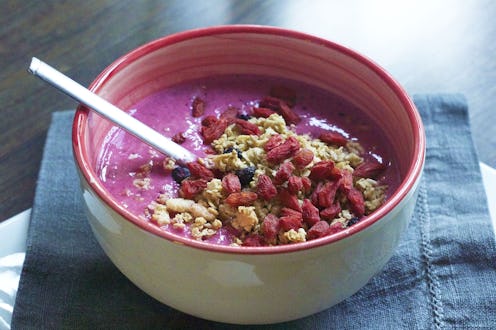Life
6 Trendy Health Foods That Are Overrated

It seems everywhere we turn, we constantly hear about the latest and greatest superfood, whether it's an acai bowl or a kale salad. Although certain foods really are nutritional powerhouses, others seem to be hyped-up health foods that are actually overrated. With so many Instagram posts and wellness bloggers touting these foods left and right, it can be difficult to discriminate between fact and fiction when it comes to their nutrition.
"The consumer always wants to know what the next best thing is," says Leah Kaufman, MS, RD, CDN over email. "It's hard to say what exactly the very best food is, but in my studies and experiences I have learned that there is no magic bullet."
A quick tip for testing the validity of a health food claim is to check out its nutrition facts label. "There are so many times when my patients base their food choices on the front of the package rather than the back," says Kaufman. "Figuring out which foods are healthy versus unhealthy could be as simple as turning over your package."
Next time you're wondering if that expensive strange-sounding food is actually good for you, consider these six overly-hyped "health foods" that aren't all they're made out to be.
1. Green Juice
Although green juice can be a great source of vitamins for those who hate to eat their fruits and vegetables, by turning your produce into juice, you are taking away one of the core nutrients in your veggies: fiber. "Fiber helps to protect against gastrointestinal diseases and helps keep you regular," says Kaufman. "Green juices can also include more than one portion of fruit, increasing the sugar content in just one drink."
2. Acai Bowls
"Acai bowls are a new breakfast trend that is catching popularity quickly, but they but may not always be the best choice for your diet," says Kaufman. Although acai is a good source of antioxidant on its own, these fruity bowls are often topped with sugary additions such as granola or sweetened coconut, which can quickly turn this breakfast choice into a junk-food option.
3. Gluten-Free Foods
"There are people who have been diagnosed with celiac disease or gluten intolerance that do need to avoid gluten, and these products were created with them in mind," says Faye Berger Mitchell, RDN, LDN over email. "Suddenly, though, many people are turning towards a gluten free diet, and there really are no health benefits." If cutting down on gluten makes you feel better, there's no reason you can't continue, but oftentimes gluten-free products contain other unhealthy ingredients that just act as a replacement to wheat, so make sure to check the products ingredients before purchasing.
4. Coconut
"Coconut, coconut oil, coconut water, and other coconut derivatives are not as harmful as we once thought, but that does not mean that they are a health food," says Berger. "It is recommended by some to cure many ailments including hormone imbalance, help with weight loss, and even lowering cholesterol. But, the science is not yet conclusive."
5. Oatmeal
"Oatmeal can be a great breakfast food, however if consumed on its own, it does not fulfill a complete breakfast," says Kaufman. Nutritionists recommend eating protein in the morning, and since oatmeal lacks the nutrient, Kaufman suggests enjoying the grain with nuts or nut butter to make it a more balanced meal.
6. Protein Shakes
"Unless you are a bodybuilder, the likelihood of you getting enough protein in your daily diet is high," says Kaufman. "Protein shakes may add excess protein to the diet and only work to increase overall calories consumed daily." These shakes also can contain added sugar, making them more of a dessert than a meal replacement.
All of these foods are fine to eat, of course, but what's important here is to really know what you're eating and not get sidetracked by flashy and often misleading labels — especially if you're really wanting to know how nutritious (or not) the food is.
Images: i nstatiablemunchies, g_firkser/Flickr; Pixabay (5)